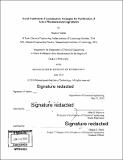Novel continuous crystallization strategies for purification of active pharmaceutical ingredients
Author(s)
Vartak, Shankul(Shankul Shisheer)
Download1117714754-MIT.pdf (13.74Mb)
Other Contributors
Massachusetts Institute of Technology. Department of Chemical Engineering.
Advisor
Allan S. Myerson.
Terms of use
Metadata
Show full item recordAbstract
The pharmaceutical sector is making a paradigm shift towards continuous manufacturing in order to improve throughput, flexibly produce tailored active pharmaceutical ingredients (APIs) in smaller amounts, utilize hitherto untested chemistry and exploit other advantages of continuous processing over its batch counterpart. Continuous crystallization is set to play a key role in the years to come since almost 90% of APIs are crystalline. This thesis presents three distinct projects with the underlying theme of industry-relevant novel continuous crystallization strategies for APIs. The first project titled "Continuous Crystallization with Nanofiltration and Impurity Complexation" establishes a methodology for simultaneously improving the yield and crystal purity for difficult-to-purify API systems in a continuous mode. This presents a better alternative to a multistep batch recrystallization process for systems where the impurity has a strong tendency for API lattice incorporation owing to similarities in structure and molecular weight. The novel process involves the addition of a complexing agent to the feed prior to crystallization in order to selectively complex the impurity and increase its apparent molecular dimensions. This sterically prevents the impurity from incorporating within the API lattice, thereby providing high-purity crystals. The increase in dimensions is further exploited using a nanofiltration membrane to purify the post-crystallization mother liquor prior to recycle. The membrane-coupled continuous mode with recycle and complexation can be tuned to provide better performance than a comparable batch or unrecycled continuous process. The second project on "Rapid Crystallization Process Development" endeavors to minimize the number of experiments to identify the best combination of temperature and solvent composition to produce crystals which can meet product specifications. This high-throughput strategy allows for reduction in both material consumption and screening time, and lends itself well to automation. The methodology has been applied to develop an end-to-end purification process for crude APIs right from solvent selection all the way to designing a 2-stage MSMPR. In the third project, "Crystallization Mediated by Functionalized Nanoporous Silica", crystallization is induced from undersaturated solution by the introduction of a functionalized nanoporous silica matrix. The matrix has been demonstrated to act as a source of bound antisolvent groups and reduce the API solubility within the small pore volume resulting in the formation of nanocrystals within the pores. The solubility reduction has been shown to stem from the nanoconfinement effects, which increase the effective internal concentration of the API within the nanopores above its bulk solubility, and from template effects of the functionalization which promotes nucleation. This presents an energy efficient strategy since crystallization can be induced from previously undersaturated solutions without the need for concentration, and the loaded silica matrix can be readily filtered and then treated with pure solvent to recover the API. The strategy can be applied for crude purification or solvent switch.
Description
Thesis: Ph. D., Massachusetts Institute of Technology, Department of Chemical Engineering, 2019 Cataloged from PDF version of thesis. Includes bibliographical references.
Date issued
2019Department
Massachusetts Institute of Technology. Department of Chemical EngineeringPublisher
Massachusetts Institute of Technology
Keywords
Chemical Engineering.